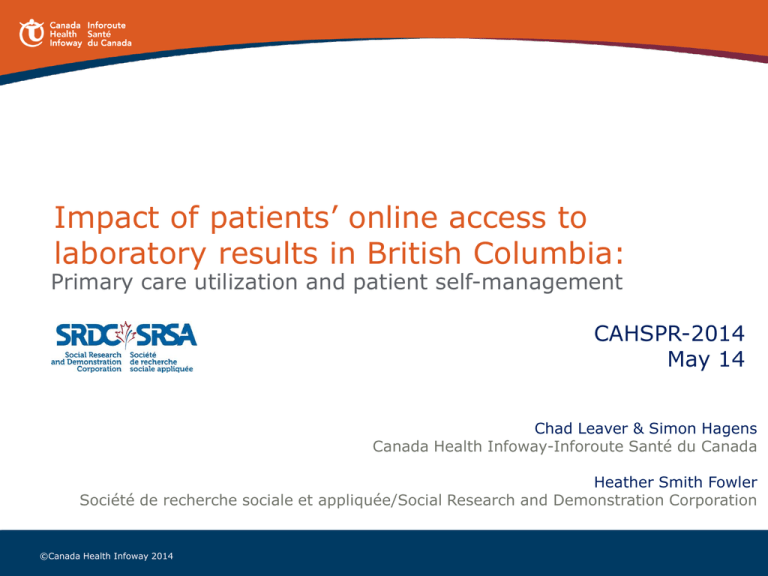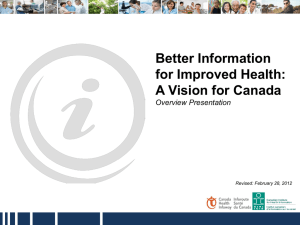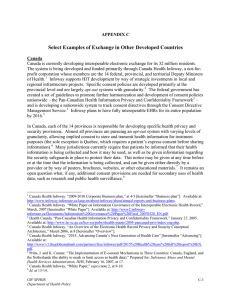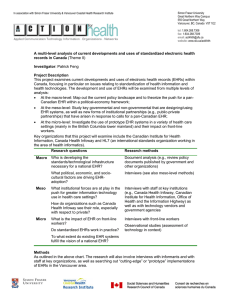Impact of patients` online access to laboratory results in British
advertisement

Impact of patients’ online access to laboratory results in British Columbia: Primary care utilization and patient self-management CAHSPR-2014 May 14 Chad Leaver & Simon Hagens Canada Health Infoway-Inforoute Santé du Canada Heather Smith Fowler Société de recherche sociale et appliquée/Social Research and Demonstration Corporation ©Canada Health Infoway 2014 Outline • Background and Canadians’ access to personal health records • • • • Research Objectives Methodology Results Discussion ©Canada Health Infoway 2014 2 Infoway’s vision Healthier Canadians through innovative digital health solutions ©Canada Health Infoway 2014 3 The emerging literature Utilization • decrease in rates of office/outpatient visits and an increase in phone contacts and messaging. Patient self-efficacy • increased rates of medication adjustment among patients with diabetes. Patient-Physician relationship • improved the quality of interactions with physicians, better informed about their own health. ©Canada Health Infoway 2014 4 Canadians’ Access to Consumer Health Tools 10% 5% 5% 6% 2% 0% access to own record 2010 2012 2013 2014 Q. Can you currently access your own medical records electronically (for example, to look up your lab test results)? Sources: ©Canada Health Infoway 2014 2010 2012 2013 2014 Infoway Infoway Infoway Infoway Innovation Challenge Survey (Ipsos Reid) Consumer Experience/Use Survey (Harris Decima) Public Opinion and Use Tracking Survey (Ipsos Reid) Annual Tracking Survey (Harris Decima) Access varies by region % Canadians 50% 40% 30% 27% 20% 3% 10% 1% 3% 0% BC AB SK/MB ON 2% ATL Q. Can you currently access your own medical records electronically (for example, to look up your lab test results)? Sources: 2014 Infoway Annual Tracking Survey (Harris Decima) ©Canada Health Infoway 2014 6 Access to record and system utilization Q24. In the last year did you access your medical records electronically (for example, to look up your lab test results)?* 0 2014 70% 0% 20% ©Canada Health Infoway 2014 40% 30% 60% 80% 53% 100% Yes No Q25. Did you visit 47% avoid an in-person because you could access your medical records electronically? Base: Respondents who can access medical records electronically (n=93) Base: Respondents who accessed medical records electronically in the last year (n=64) *Question modification since 2013: Have you ever accessed your electronic medical record 7 (for example, to look up your lab test results)? Direct patient access to lab results ©Canada Health Infoway 2014 8 Four key research questions: 1. Does direct lab access improve patient experience? 2. Do patients with direct lab access receive their results more reliably or more quickly? 3. Does direct lab access impact patients’ follow-up and contact with their physicians? 4. What is the impact of direct lab access on physicians and their practices? OBJECTIVES, DESIGN AND METHODOLOGY Research objectives 9 A mixed methods approach: • qualitative – key informant interviews with a small group of physicians • quantitative – an online survey of patients (n = 3292) A quasi-experimental research design: • A treatment group - people who are current subscribers to an online direct lab access service (the service users group; n=2064) • A comparison group – a matched sub-group of a general population panel (n=1245) OBJECTIVES, DESIGN AND METHODOLOGY Research design 10 • We balanced the outgoing sample for the comparison cohort by age and gender to better match it with the treatment cohort (service users) • The sample was then weighted according to the proportion of service users who had abnormal results on their most recent lab tests • In the final sample, some differences were observed: • • • • • • PARTICIPANT PROFILE Notes on the final sample Immigration status/Language speak at home Income Education Region Lab tests service utilization Access to consumer health solutions 11 PATIENT OUTCOMES Key patient outcomes Service reliability Health service utilization Empowerment Satisfaction and comprehension Anxiety 12 Service reliability – key results Service Users Comparison Group Received their most recent lab test results “in a few days” 82%** 36% Know the results of their most recent lab test 91%** 73% 13 Comprehension – Key Results • Practices will need to work differently to support patients with direct access to results Confident that you fully understood your lab results? (score = 7-10) Not confident that you fully understood your lab results (score <7) Service Users Comparison Group 76% 85%** 24%** 15% 14 Anxiety – Key Results No more anxious after receiving results After receiving lab test results Before receiving lab test results 30% 30% 27% 25% 25% 25% ** 20% 20% 15% 15% 10% 10% 5% 5% 0% 0% Some (50-100) Service Users group Note: **p<0.05 Comparison group 14% 15% Some (50-100) Learned Online Learned Otherwise % responses 50 and above on 100 point anxiety scale 15 Utilization – Key Results Contacted their doctor/clinic while waiting for results Any in-person visits in the process of receiving or discussing lab test results Service Users Comparison Group 9% 28%** 59% 83%** 16 • Physician interviews - short and conducted with a small convenience sample; • No random assignment to treatment – limited attribution • Comparison group matched to service user respondents, not all service users or the general population; SURVEY RESULTS Study limitations • Survey was very specific & linear - may not capture different ways patients use the service • Focus on patients’ most recent test may not represent typical experience 17 1. Patient experience – Direct lab access had generally had positive effects 2. Effectiveness of lab test services delivery – Service users reported clear advantages in terms of service reliability and timeliness 3. Utilization of health services – Service users reported lower rates of contact with physicians, both while waiting for results and afterwards. Still, almost 60% of service users reported having an in-person visit to discuss their results 4. Physician’s practices and relationship with patients – In general, physicians reported no administrative or clinical changes to their practice, and made several suggestions on ways to improve direct lab access services. SURVEY RESULTS Conclusions 18 • Study supports the emerging literature that shows personal health records enhance the quality of patient-physician interactions, with little to no change in administrative practice or burden. • While the majority of patients reported positive experiences, there seemed to be more benefits for those who required frequent monitoring (e.g., for chronic health conditions). SURVEY RESULTS Implications • Service development should help patients and physicians make sense of what lab test results mean, with tools (e.g., glossaries) and other resources. • More research could help understand how benefits are achieved, and how they can be maximized in different healthcare contexts. 19 Thank you ©Canada Health Infoway 2014





